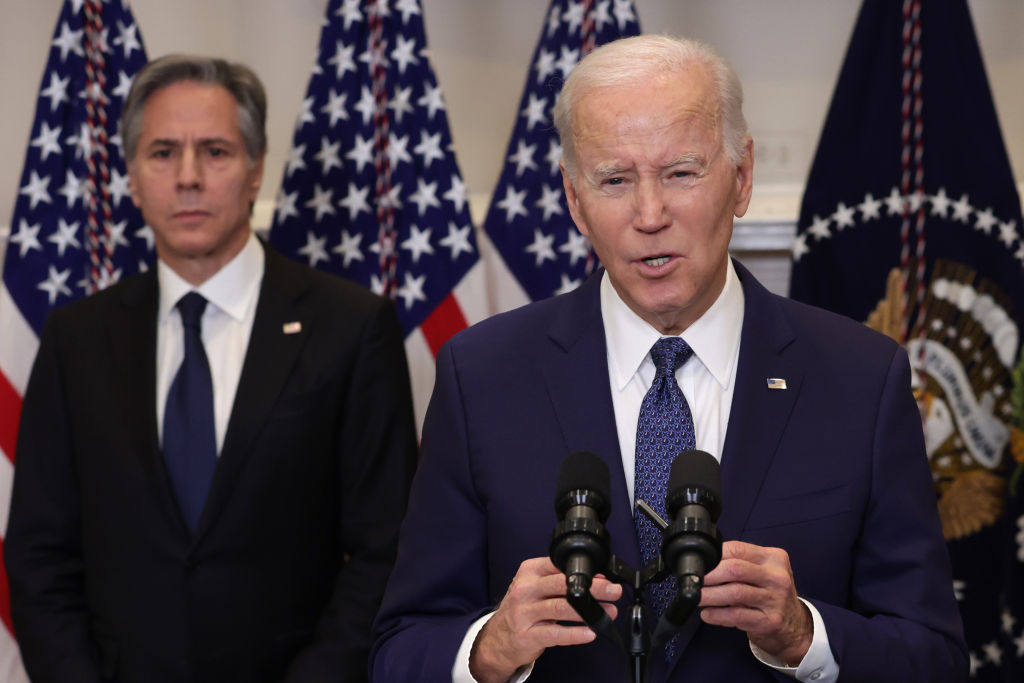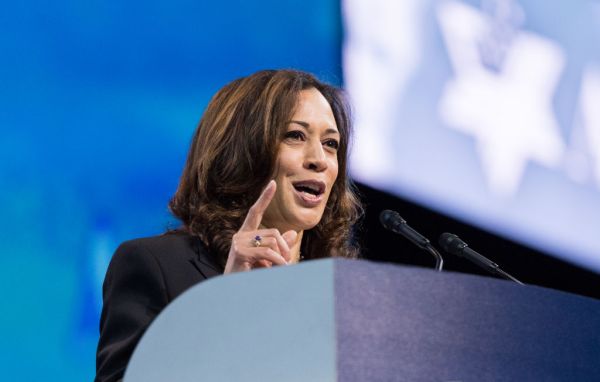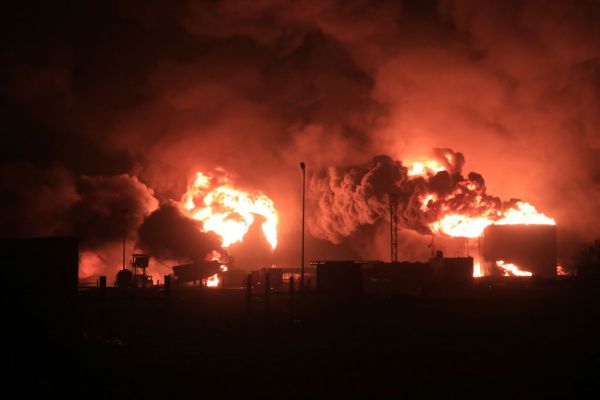Confronted with a regime that has been rapidly increasing its capacity to enrich uranium to bomb-grade, senior officials in the Biden administration have started to ask an eminently sensible question: Why hasn’t the Islamic Republic already gone nuclear? In a perfect world, the CIA or NSA would be able to read the intentions of our enemies and answer that question. Instead, it’s a good day when intelligence services can tell us what our enemies can do. And so with Iran, the Biden administration is in a perverse gray zone, uncertain whether the clerical regime intends to construct a nuclear weapon, and if so, when, and whether it has already mastered the technology required to detonate a nuclear device.
Despite its enormous progress since the program became serious in the early 1990s, the theocracy has exercised a certain restraint in building the wherewithal for an A-bomb. Assuming the regime has mastered the engineering required to construct a nuclear trigger (neither the CIA nor Israel’s Mossad appears to know), volition would be the missing element. As much as it’s a sensible question, asking it, and centering U.S. policy on it, are, of course, self-serving for the White House: The administration gets more wiggle room and less anxiety about Iran’s atomic progress if it surmises that its supreme leader, Ali Khamenei, has decided for whatever reasons not to construct a nuke.
There could be many reasons beyond the engineering challenges why the theocracy hasn’t yet built and tested a weapon. Likely the most important: Fear of the United States may not have sufficiently dissipated. The real issue for the Iranians has always been their assessment of U.S. willpower. George W. Bush’s decision to invade Iraq in 2003, his equally startling decision to back the surge in 2007, and Donald Trump’s decision to kill Iran’s dark overlord, Qassem Suleimani, in 2020 after the president had failed to respond to Tehran’s assaults against Persian Gulf shipping and Saudi oil refineries in 2019, are telling examples of how Washington can both scare and confuse Tehran. Although the Biden administration hardly has a fearsome reputation in the Middle East, American military potential remains significant.
And there is the significant problem of Iranian internal security: The Islamic Republic leaks. There is a high correlation between advanced education and dissent; the theocracy may well be fearful of taking the final atomic steps because it’s uncertain whether such action would remain secret, thereby playing into the uncertainty about whether America’s willpower is spent. While the regime seems less fearful of an Israeli air strike against its nuclear facilities, which have been going underground, Israeli covert action—assassinations, drone strikes, and other impressive operations—against the nuclear program may have raised their anxiety about Israel’s ability to damage the regime’s nuclear ambitions. Mossad obviously picked up sensitive intelligence from Iranian sources, either human or through intercept, that allowed these daring covert-action operations. And concern about the loyalty of the educated elite has grown since the death of the young Kurdish-Iranian woman, Mahsa Amini, which provoked nationwide demonstrations and unprecedented rumination within ruling circles about the withering of revolutionary faith and popular anger against the theocracy.
Basing U.S. policy on the possibility that Khamenei is wavering on whether to build a bomb rather than centering it on Iran’s capacity to do so ineluctably changes the calculations of American diplomacy; it effectively eliminates the already minuscule chance that the Biden administration would militarily attempt to stop the clerical regime’s nuclearization. Having convincing human-source or technical intelligence on Iran’s final technical step and, more importantly, on the supreme leader’s intentions, at the moment required, would be an unprecedented feat for Langley or the NSA; it’s also the type of secret intelligence an administration desperate to avoid another American war in the Middle East could surely ignore.
A policy embracing analysis that Khamenei may not go for the nuke will also have a telling effect on U.S. sanctions. Significant new sanctions on Iran, or “snapping back” past measures will remain unappealing to the Biden administration since it could also provoke the clerical regime to build and detonate. The time it would take sanctions to crack Iran’s economy or somehow render sufficient pain to deter its nuclear ambitions—if any kind of economic coercion could accomplish this task—is much longer than the timeline for Iran to build a bomb.
And this fearful American reasoning may well match Iranian calculations that could prove decisive for the supreme leader. Would the clerical regime lose more by going nuclear than it would gain? Regionally, going nuclear makes sense. Iran would instantly have a potential check on Israeli actions. The Jewish state is near the center of the concentric, mainly antisemitic conspiracies that animate the worldview of the Iranian political elite. And Israel is now attacking the clerical regime inside the Islamic Republic. The “war between wars,” Jerusalem’s approach to continuously countering and degrading the theocracy’s capacity to strike Israel, means, among other things, that Israeli strikes against the Islamic Republic and its allies will continue and probably intensify.
It’s reasonable to surmise that the Islamic Revolutionary Guards (IRGC), who oversee Tehran’s nuclear-weapons program, may think that a bomb will induce more hesitation in Jerusalem. That may be a poor assessment of Israeli willingness to keep bloody pressure on the clerical regime, but it’s not unreasonable for IRGC commanders and Khamenei to think otherwise. Israeli military men and the press sometimes talk about the braking effect that Iran’s supply of missiles to the Lebanese Hezbollah has had on Israeli policy, especially vis-à-vis preventive raids on the Islamic Republic’s nuclear program. This missile supply hasn’t stopped Israel from attacking Hezbollah. But add a bomb to this mix and Iran might think it could get the deterrence it is missing.
Given the contempt Iran’s ruling elite have for the Saudis and Emirates, the regime isn’t likely concerned about either eventually going nuclear in response to a Persian nuke. More likely, the mullahs and the guards have always viewed their nuclear quest as a means of humbling the Sunni Gulf states, first through diminishing their faith in the United States’ commitments and, second, through a direct challenge to escalate. As was clearly on display in 2019 after the Islamic Republic attacked the Saudi oil facilities at Buqayq and Khurais, which temporarily took offline about half the country’s production, the Saudi spine wobbled. Crown Prince Muhammad bin Salman pleaded for American intercession. The Emirates, who benefit enormously from Iranian trade and sanctions-busting, immediately sent an emissary to Tehran, most likely to proffer friendly neutrality.
And the supreme leader may not worry that much about a united Western front against a nuclear Iran. France and Britain drove the European Union’s approach to the Islamic Republic before the JCPOA, but neither has much fire in the belly today about the clerical regime’s nuclear designs. American political oscillation, Brexit, France’s decline within the EU, and the war in Ukraine have all atrophied European concerns. Sanctioning an established nuclear power could grate against the realpolitik that tends to dominate the EU. In particular, France, which still leads the continent on non-proliferation, likely would be averse to severe sanctions against a nuclear-armed Iran. Defaulting to reality, as the French would surely put it, Paris would advocate engagement, not isolation and crippling sanctions.
Iran’s alliance with Russia, the use of its drones in Ukraine, and the brutality that the regime is showing toward disobedient, theocrat-hating young girls are unlikely to alter these calculations. If the Biden administration won’t renounce the JCPOA and further nuclear diplomacy, or seriously amp up sanctions because of malevolent Iranian actions, French President Emmanuel Macron surely won’t. Unlike Republican and Democratic presidents, who have all sworn that America would stop Iran from getting the bomb, French presidents haven’t similarly pledged the nation’s honor. An Iranian nuclear victory, however painful to Paris’ influential non-proliferation crowd, could be shrugged off as an American defeat. Like the Biden administration, Paris will happily blame Donald Trump, who withdrew the United States from the JCPOA, for speeding up the Iranian nuclear clock.
Neither is Tehran worried about Beijing. China has repeatedly prevented American efforts to hobble North Korea, before and after it went nuclear, and is most unlikely to change its current laissez-faire attitude toward Iran, a significant oil supplier to China. A nuclear-armed Islamic Republic actually improves Beijing’s and Moscow’s position in the Middle East since the Chinese and Russians do have influence in Tehran. Chinese ties to Saudi Arabia, another major oil supplier to Beijing, are enhanced by a clerical regime with the A-bomb. The more fearful Saudi Arabia becomes, the angrier Riyadh is at the Americans for failing to stop Tehran’s atomic program despite all the promises, the better the odds that Beijing could replace Washington as the primary outside power in the region. China can’t soon hope to match the U.S.’s greater military capacity in the Middle East, but that matters less after the clerical regime goes nuclear. If America won’t go to war to stop the Persian bomb, what would it fight over in the Gulf? The more that question is asked, the stronger the Chinese position becomes.
China is well aware that U.S. naval and air power in the Middle East could choke off essential oil supplies in the event of a war over Taiwan. The more the Islamic Republic can undermine Sunni Gulf Arab confidence in the United States, the more likely that Arab monarchs will veto or complicate any American effort to punish China in the region.
The only Muslim country that might, from an Iranian perspective, become unhelpfully spooked by an Iranian nuclear test would be Turkey, which has the technical wherewithal, industrial base, and wealth to build an atomic bomb, perhaps pretty quickly. Turkish-Iranian relations are complicated: sometimes friendly, often suspicious, and occasionally lethally hostile, especially in Syria. Turkey’s military capacity and economic potential is vastly greater than Iran’s. The Persian psyche sees Turks as the stronger people, recognizing, however reluctantly, that the latter’s greater Westernization has produced a more dynamic nation with more potent armed forces. Turkey’s increasing Islamic identity doesn’t necessarily relieve Iranian concerns about regional disagreements, especially over Syria, Azerbaijan, Armenia, and Russia. Trepidation about Turkey might affect Khamenei’s calculations about testing. However, that ratiocination, or any of the other considerations involved with other countries, didn’t prevent the clerical regime from pushing its atomic ambitions close to the goal line.
For the Biden administration, guessing why Khamenei hasn’t yet gone for the nuke is less interesting than the fact that he currently doesn’t have the bomb and from that concluding the supreme leader may not actually want to complete a program he has overseen since 1989. Provoking him in any way that might encourage the regime to build and detonate a weapon is probably a step too far. The administration, which remains uncomfortable with the use of force abroad and often seems guided by Barack Obama’s depiction of America as an over-muscled giant inclined to do “stupid sh*t,” still sees the Middle East as a sand trap, waiting to ensnare the United States in another costly confrontation.
The White House is currently doing an awkward dance with Tehran. U.S. officials say that nuclear negotiations are on a cold back burner, but they nonetheless send signals to Tehran that diplomacy remains viable—despite the clerical regime’s aid to Russia’s war against Ukraine. The administration has thrown new sanctions at Iranian officials and organizations that have had something to do with repressing the recent, ongoing protests. Small sanctions of dubious punitive impact are becoming what one does in Washington when one doesn’t want to (or can’t) do anything else.
National Security Adviser Jake Sullivan and Secretary of State Antony Blinken have met with prominent Iranian dissidents. Their manner and language didn’t really convey passionate intent, but given the reluctance of the Obama administration to even mention wicked Iranian actions (mass murder in Syria), it seemed sincere. The Pentagon did hold the Juniper Oak exercises with Israel in January, which were played up in the press as prep work for a possible military clash with Tehran. But the White House’s inclination was to downplay the operation; it wasn’t an exercise aimed to tell Tehran that America and Israel were practicing for a first strike.
The administration’s focus on Iranian intentions, not capabilities, will unavoidably create tensions between Washington and Jerusalem, which judges Tehran’s nuclear threat first by its technical progress and second by its rampant antisemitism. Israel’s “war between wars” will probably intensify as Jerusalem struggles to find some means to upset Iran’s advance without itself launching preventive air raids, which the senior staff of the Israeli Defense Forces may still believe are just out of range of Israeli capabilities. (In 2011, when Prime Minister Bibi Netanyahu and his defense minister Ehud Barak tried to convince the cabinet of the wisdom of such strikes, the IDF demurred.)
Provoking the clerical regime to do something “stupid”—that is, something that might bring the United States into direct conflict with Tehran—may well become the only possibility that Israel has of derailing the Islamic Republic’s atomic ambitions short of launching air raids that have declining chances of success. And even if Israel accepts the Islamic Republic’s nuclearization, which it may perforce have already done, tension with the United States could still increase. Israelis, at least those of stout heart, may not want a Persian bomb to deter Jerusalem’s actions in the Middle East. Tehran will undoubtedly try to use its nukes as a defensive umbrella for its activities abroad, especially in the Levant and Yemen. Iran would already have transferred medium-range ballistic missiles and built substantial bases in Syria had it not been for constant strikes by the Israeli Air Force. Israeli deterrence is now premised on a running war. Either under Democrats or Republicans, Washington may become more fearful of escalation with a nuclear Islamic Republic than the gradual degradation of the Jewish State’s security interests.
Knowing your enemy’s mind has been an age-old quest that seldom has borne as much fruit as knowing the capacity of your enemy’s hard power. The White House has shifted its focus on Iran primarily because it has chosen not to counter the clerical regime’s nuclear progress militarily. The Bush, Obama, and Trump administrations did exactly the same thing, but the atomic redline for them, in Washington time, was far off. Without vitiating the American promise to forestall a Persian bomb, they could punt.
Today the only way President Biden gets to punt is if Khamenei cooperates. And the supreme leader has, so far, given the White House a sliver of hope that Biden won’t have to deal with Revolutionary Guards with nuclear weapons. For an America still set on retrenching in the Middle East, whatever Khamenei offers likely will be enough. The White House has already accepted a slowly degrading status quo, where the clerical regime keeps increasing its stockpile of highly-enriched uranium and violating safeguards and protocols of the International Atomic Energy Agency. Why not a bit more? Eastern Europe and the Far East beckon.








Please note that we at The Dispatch hold ourselves, our work, and our commenters to a higher standard than other places on the internet. We welcome comments that foster genuine debate or discussion—including comments critical of us or our work—but responses that include ad hominem attacks on fellow Dispatch members or are intended to stoke fear and anger may be moderated.